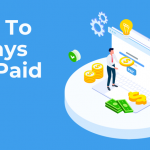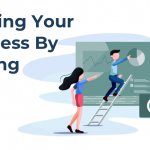
It’s time to let you all in on a secret:
No element of our success is a secret.
If you’ve been aware of our blog, our YouTube Channel, etc, for any length of time, then you know that the BrainLeaf team (and especially our Fearless Leader, Jason Long) is an open book of experience and knowledge.
But everybody is always looking for a “trick” or a “secret” to get ahead. Worse – when they figure out something that works, they want to hide it to maintain at least some perception of advantage.
The problem with that is that it goes entirely against the strategies that have worked for us over the last twenty years.
(Wow. Twenty years…)
How? Because it just seems like common sense that when you find a competitive edge, you guard it. Well, that’s fine if you’re actually competing. When it comes to getting sales, you don’t need to hide your strengths from potential clients.
Whether you’re an attorney or an accountant, your strengths and talents are things that you put forward and promote to help draw in sales. Why would it be any different when you run a digital agency or a construction firm?
Never Underestimate the Value of Expertise
The first thing to know about closing sales: people want their problems solved. And, preferably, by somebody who knows what they’re doing and won’t waste a lot of time. They know that quality can cost a little more sometimes, but a lack of quality almost always costs more in the long run.

What this means for you: if you are a source of reliable, quality solutions, then people want to work with you.
But what determines the quality of your services? Good reviews and referrals are solid indicators, but those come with a catch: you have to get clients first before anybody can review you.
So you need something else as your primary draw: expertise.
See, nobody is going to hire you for a generic problem. Even for mild niche problems, your potential clients probably have somebody on staff who can handle it for much cheaper. So if a company or organization is looking for outside help, they need a specialist – somebody who knows how to handle the problem with maximum efficiency.
Teach What You Know
So you need to advertise what you know. You need to illustrate your expertise and prove that you have the knowledge to solve this problem that nobody on their staff can effectively handle.
Over the last 20 years, we’ve found that the best way to project expertise is to take what you know and give it away. Yes, as in just tell people how to solve their problems. Share your secrets.
If you’re a roofing specialist, educate people on how to spot weak points in different roof types or find leaks before they happen. If you’re a digital security expert, teach your audience about different protocol types and how to best utilize different types of firewalls.
Because if you do that and convince your audience that you know what you’re talking about, then they’ll want you to take care of their problems. If there is any uncertainty about somebody on their team being able to implement the solution correctly, then most companies will prefer to hire somebody to ensure it’s done right, even if you’ve already told them exactly what to do.
People are paying you to fix their problems
So don’t be shy: tell people how to fix their problems. Do it with videos, blog articles, Quora posts, Facebook Groups – any method you have at your disposal to get your brand out there, utilize it. Many of them are free, so there’s really no reason not to.
I mean, what else is this article if not that?
Even Instagram and TikTok have become legitimate avenues for illustrating your expertise. You can make a short video, less than a minute long, showing people how to solve a really common, but simple, web design/marketing/SEO (or whatever your niche is) problem, post it to TikTok, and get insane amounts of exposure.
The bottom line is: teach people as much as you can, and they will trust you.
The Handshake Still Wins

Digital has become all-powerful. It’s in every aspect of our lives. But there are some aspects, especially in business, where it still fails to solidify its power. This has to do, of course, with psychology. People have difficulty fully trusting people they’ve never met.
Nothing can, currently, replicate the ability to look into somebody’s eyes and shake their hand. Even in video – you can just do multiple takes until you have every ounce of your pitch perfected.
Actual one-on-one interaction, though, allows people to get feedback about their conversation partner in real-time through facial expression, vocal tone, mannerisms, and, of course, word choice and phrasing. All of these are crucial elements, and it’s all raw.
Take the time to know people
We take time to go to these entrepreneurship meetups and industry meetings because there will, inevitably, be questions where we can illustrate the depth of our knowledge and our team’s capabilities. When that happens, there will be people listening who come away with the conclusion that this team right there knows what they’re talking about.

See, it’s still about illustrating expertise. That’s more than half of the battle. Because once people have attributed value to your knowledge and abilities, it’s much easier to ask them to commit to the cost of your services.
This in-person approach goes deeper, however.
Eventually, you’ll find yourself in a one-on-one conversation with potential sales on the line. When that happens, don’t forget this very important tip: Don’t just talk about yourself. You’re going to need to at some point, but first, you need information.
So ask them questions: “What do you do? Tell me about your job. What problems have you had?”
Show interest in them, let them speak. First, because it’s the polite thing to do. Second, because you might learn something. Third, you can use whatever information they’re willing to give to figure out how you might be able to help them.
Once you figure it out, offer your knowledge. Build up the relationship. You don’t have to push for a sale right away (use your judgment). You may never get a sale out of this person (and that’s okay). But if they ever have a serious problem, they’ll come to you first.
Story Time!

Our CEO, Jason Long, actually had this situation occur within a week prior to this article being written. I’ll let him take over:
“Somebody I haven’t talked to in a long time called me, and it was just a catch-up. It was somebody I actually met at a conference. He was at a booth; I was just walking around talking to people and happened to wander up to his booth.
“He was trying to explain to me what he did. And it turned out he actually lived in the same city that I was living in. And we caught up over a video call today.
“During that call, I was like, ‘Hey, I see how you doing this but have you thought about it like this? I think that you’re gonna waste your money going in that direction.’
“And right off the bat, his response was, ‘Oh, that’s such a good idea. I didn’t even think about that. And can you help me with it?’
For this reason, we’ve found that a core element of our success is participation in events like conferences, entrepreneur meetups, Chamber of Commerce meetings. Get away from the computer screen and out into the sunshine now and then (even if it’s just to get to another building where you can bathe in fluorescent lighting).
“Of course, I told him, ‘yeah, we can help you with that, that’s exactly what we do.’
“Initially, he tried to sell me on something. I ended up selling him on something because he came to me and asked for help with it.”
Jason continues to cite another real-world example:
“There is a client that we’ve got now. We got started with them because, once again, I was at a conference. I went out in the world under the sun, out away from the computer. Where you actually talk to people. And somebody was trying to sell me on doing something. During this process, they got my card.
“Later on, they sent me a message, we got to talking. We did a demo. It was something that I was kind of interested in, but I wasn’t really sure. It was really more like maybe my clients could use that tool. And while we’re in the meeting, I was like, ‘Hey, I’m pulling up your site on Ahrefs. And I saw that your SEO isn’t that good? Can I show you what I’m seeing?’
“So we pulled it up on the screen share, and I showed it to him and pointed out: ‘You guys are lacking here, here, here, here. And here. You have these keywords you’re missing out on, if you put some work in here, here, and here, by just doing these things, you could probably get some more sales.’
“They weren’t aware of any of this and opted to pass it up to their boss. And then about a month or two later, the CEO at the company calls me up and says, ‘Hey, I was talking to my sales guy and saw that you have this thing. Maybe we can talk.’
“I walked him through the problems that I saw. I didn’t sell him on anything. I didn’t ask him for a sale. He came to me and, at the end of the meeting, he asked, ‘Can you just do this for us? I don’t have the people on my team to do it. Can your team do it?’
“We put together a proposal and now we’re working with them. Now we’re doing those things for him.
“And it all came about through giving away this knowledge.”
“Experience Is The Most Valuable Thing You Have To Offer.” – Randy Pausch

There’s a reason why most employers look for experience – even for entry-level jobs. Nothing can supplant it or replace it or stand in for it.
Your expertise is, more than anything, what allows you to bill for your services and your time. Advertise it. Show it off. Let people come to you simply because they know that you know what you’re doing.
You will find no easier sales, nor advertisement. Because the people you convince this way will happily pass your information off to other people they know when you prove your worth.
So go and spread your knowledge. Online or in the real world; locally or internationally. Do it as often as you can, in as many places as you can, and you’ll find that the sales just start to roll in.
Good luck, and thanks, as always, for reading.
– Jason





